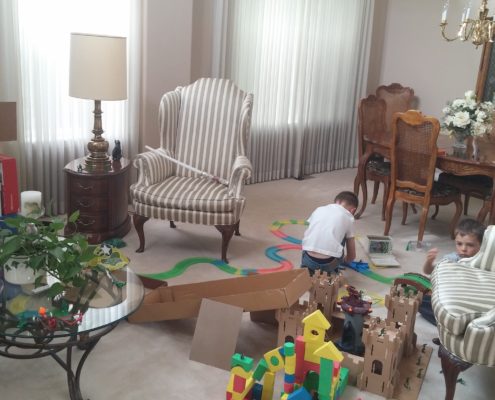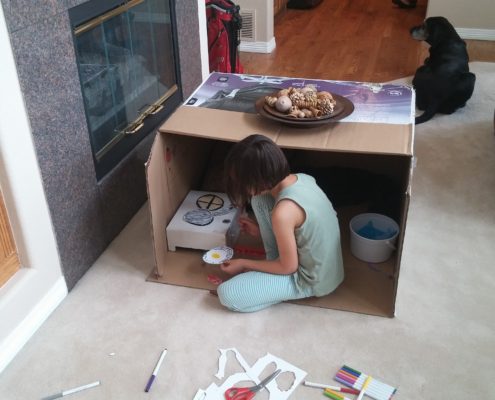It’s Never Too Late To Be A Genius. Don’t Forget – You Were One Once!

Einstein was told he was stupid.
 Yours truly was stupid – for the better part of 55 years.
Yours truly was stupid – for the better part of 55 years.
Not because anyone called me stupid – other than a little demon in that fatty-acid clump between my temples.
It all started with my mistaken interpretation of a standard IQ test taken somewhere along my high school journey – I don’t remember when exactly. Somehow I interpreted – or was told by someone – that my score was substantially below average. In other words, I was kinda stupid.
And a little demon was birthed.
That’s not a good thing when the hormones are raging as an adolescent. It’s just not a great combination.
It leads to a “personality.”
Sure, we all have a personality. As life coach Steve Chandler reminds us, we fundamentally stay what we became in junior high school. Then we operate out of that personality, play the life game, and forget we were once geniuses.
Do you remember when you weren’t a personality? When you were in your genius years. When you enthusiastically, unabashedly tapped into that thing called “creation.” Even at my age, I remember spending whole days as a child – sometimes alone, usually with others my age – making stuff up, acting things out. Maybe it was made up games on a vacant lot with an old abandoned shed; or a new mound of dirt at a construction site, or a house of blankets and sheets stretched across furniture, or trying to build a tree house – or just turning whatever you could get your hands on into something.
Kinda like this – when my 7- and 8-year old grandsons get together and tap “nana’s” toy bin or my 10-year old granddaughter decides to go into premature domesticity in a box house.


We didn’t have or need Disneyworld growing up. We did our own Disneyworld where we were with what we had. We were geniuses.
Until we weren’t.
What happened?
Grown-ups happened! Parents, peers, professors. The “P’s” – those ahead of us whose creativity had been suppressed and now felt compelled to continue the culturally-defined suppression.
As Chandler writes:
“Grown-ups project their own lack of creativity on their young children and take them places like Disneyland or Chuck E. Cheese constantly to over-stimulate the child. They are projecting their own emptiness on the soon-to-be spoiled child. Children don’t need all that. Children can (and will) create anywhere with anything.”
How do we lose that creativity? Chandler nails it:
“- by assuming personalities and then defending those personalities with our lives. No more creativity, just defense. Now I’m afraid I won’t get a job. I’m afraid my spouse won’t approve of me, and I’m afraid of my employer, and I’m afraid I won’t raise my kids right. And soon, I’m out of energy. Because nothing takes more energy to maintain than a fear.”
I’m not into victimology and don’t point fingers. Except at my own thinking – the thinking that produced that little demon. Perhaps it had a bit of a nudge from a parent or peer or professor/teacher. But I owned it and nurtured it into my 60s. My personality formed around it.
My little demon persisted despite the fact that I survived pretty well in light of my perceived deficiency.
- Graduated high school, popular (not hard in a high school of 90 kids).
- Finished college (OK, three tries and nine years post-high school – the demon loved it).
- Did above-average in career and ladder climbing, pulling down some OK jack.
- Married way over my head to someone much smarter and with far fewer blind spots.
Still, my little thought demon had me convinced that I should be intimidated and be rendered speechless in the presence of someone I perceived to be of higher intellect, ability, title, and status. No way I could measure up, look smart, or leave an impression. So, best to just avoid the encounter.
With the persistent help of she who is “smarter and without many blind spots” and a gradual rise in my self-awareness, I started retiring the demon in my 60s. It wasn’t going willingly. Remnants still surfaced.
Until my 50th high school reunion, ten years ago.
The reunion was a big deal. Half of my class showed up! All six of us had a ball. (Yes, you read that right – 12 in my graduating class. No, it wasn’t a one-room school!)
One of my enterprising classmates had rifled through some school records that were about to be thrown out as the state announced they were going to preserve our high school as a state historical site. She found files of high school transcripts for each of us in attendance at the reunion.
And there it was – the record of my IQ test. Along with old test papers, report cards, teacher’s reports (deportment was not one of my strong suits).
My IQ test graded slightly above average!
The demon exited!
Now, a conversation with someone who I would have perceived as of “higher intellect, ability, title, and status” is easier because I know most are operating from the defense of a personality that mostly isn’t real. Just like in my world. Despite their intellect/ability/title/status, I know the defense of their personality is at the expense of creativity that never really left them.
It just got “P’ed” on.
That’s why I like working with folks entering the “second half”. It’s about then that personality defense and 35 years of catering to cultural expectations become tiresome, energy is in shorter supply, and there’s a concern that there’s a limited time period in which to “make a difference.” It’s a “turning point” in which one can operate from purpose and not personality and re-connect to core creativity and bring it back even stronger than in childhood.
It’s why I’ll be adding a new company over the coming months – “Turning Point Career Services” – with the intent of offering coaching services and other resources designed to meet people at this second-half juncture and help them move forward from there with purpose in the lead, not personality.

That creativity and spirit we all had as 7-year-olds didn’t leave. It just got barnacled over, enculturated, and tamped down. But it can come raging back if we’ll set it free.
That’s what the second half of life can be all about.
Maybe some of you can relate. We’d love to hear about it. Scroll down and leave a comment or drop us a note at gary@makeagingwork.com.





I love this blog, … the story, the path and the intro to your new / added company.
Thank you for hop skipping through our lives and sizing it up so positively.
pat
As someone entering “my second half of life” this article truly resonated with me. Thanks for helping put things in a new perspective for me.
We are a group of volunteers and opening a new scheme in our community. Your site provided us with valuable info to work on. You have done an impressive job and our whole community will be thankful to you.
Hello makeagingwork.com administrator, Good job!
To the makeagingwork.com administrator, Your posts are always well researched.
Dear makeagingwork.com admin, Thanks for the well-researched post!
Hello makeagingwork.com owner, Your posts are always well-received and appreciated.
To the makeagingwork.com webmaster, Your posts are always well-structured and logical.
Hi makeagingwork.com administrator, Your posts are always well researched and well written.
Hello makeagingwork.com owner, Your posts are always informative.
Hello makeagingwork.com webmaster, Your posts are always well thought out.
Hi makeagingwork.com administrator, Your posts are always well-supported by facts and figures.
To the makeagingwork.com webmaster, Your posts are always a great source of knowledge.
Hello makeagingwork.com administrator, Keep the good content coming!
Hi makeagingwork.com administrator, Your posts are always well-supported by facts and figures.
Hi makeagingwork.com owner, Thanks for the well written post!
Hello makeagingwork.com owner, You always provide great examples and real-world applications.
Your writing has a way of transporting readers to far-off places and different experiences.
Your blog sparks a sense of curiosity and encourages readers to explore new ideas.